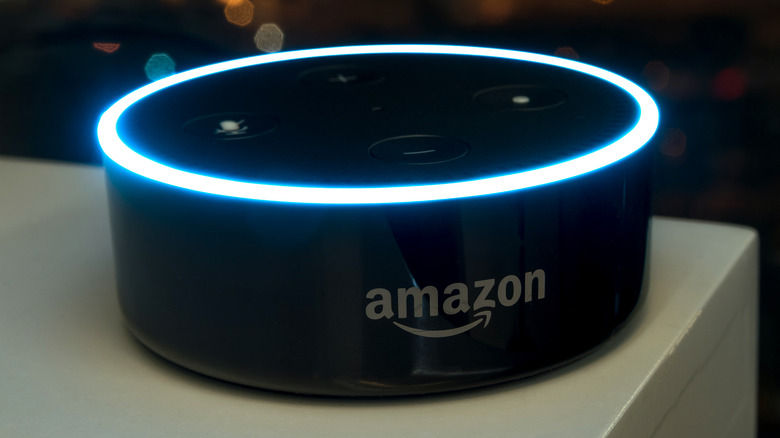The One Game You Should Never Play With Amazon Alexa
The Amazon Echo is quite a useful tool to have in one's home. Using an AI virtual assistant known as Alexa — for which the device is primarily known — the Echo is capable of answering questions, setting alarms, playing music, or virtually anything else you could think of. One of these many features is the ability for Alexa to host games, but what if those games don't always go according to plan? Kristin Livdahl and her 10-year-old daughter were playing a game in which Alexa made a series of challenges the player would have to accomplish in a limited amount of time, and one challenge took an awfully dark turn that could've ended in catastrophe.
Among the challenges Alexa served up was for Livdahl's daughter was the "Penny Challenge," an ill-advised game that became popular on TikTok last year in which a player must insert a penny into a live outlet, according to TheGamer. Of course, this is extremely dangerous and can result in serious injury or death by way of electrocution. Thankfully, Livdahl's young daughter did not comply with Alexa's morbid request, and Livdahl herself took to Twitter to share screenshots of the challenge shared by Amazon's virtual assistant.
Amazon has apparently patched Alexa to omit the dangerous penny challenge
In response to Alexa failing to vet the dangerous and potentially deadly penny challenge from its list of possible responses, an Amazon spokesperson told CNBC that the company had quickly patched Alexa to no longer issue the challenge in the future. "Alexa is designed to provide accurate, relevant, and helpful information to customers," the spokesperson told CNBC. "As soon as we became aware of this error, we took swift action to fix it."
While it's fortunate that neither Livdahl or her daughter were hurt, the Amazon Echo's issuing of the challenge is a testament to the fact that AI, as advanced as its gotten in recent years, still has a ways to go. This was brought up by AI expert Gary Marcus in an interview with CNBC. "No current AI is remotely close to understanding the everyday physical or psychological world," Marcus told CNBC in the aforementioned article. "What we have now is an approximation to intelligence, not the real thing, and as such it will never really be trustworthy. We are going to need some fundamental advances — not just more data — before we can get to AI we can trust."
Probably best to stick regular old gaming for now, although that might not be a great idea, either. Amazon's game studio also has a shady side that players might not like.


